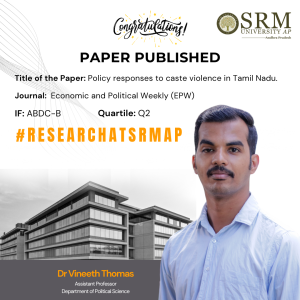 Dr Vineeth Thomas, Assistant Professor in the Department of Political Science, has recently published a paper titled “Policy Responses to Caste Violence in Tamil Nadu” in the esteemed journal Economic and Political Weekly (EPW). In the paper, Dr. Thomas offers valuable insights into the crucial issue of caste violence in Tamil Nadu and examines various policy responses aimed at addressing this complex societal challenge.
Dr Vineeth Thomas, Assistant Professor in the Department of Political Science, has recently published a paper titled “Policy Responses to Caste Violence in Tamil Nadu” in the esteemed journal Economic and Political Weekly (EPW). In the paper, Dr. Thomas offers valuable insights into the crucial issue of caste violence in Tamil Nadu and examines various policy responses aimed at addressing this complex societal challenge.
Dr Thomas’s research illuminates the dynamics of caste violence and provides a comprehensive analysis of the policy measures adopted to tackle this pressing issue. His work in the EPW is expected to significantly contribute to the discourse on caste-based conflicts and policy formulation in the region. The publication of this paper not only exemplifies Dr. Vineeth Thomas’s scholarly prowess but also underscores SRM University—AP’s commitment to fostering impactful research in the realm of social and political sciences. It is anticipated that this publication will stimulate further academic dialogue and influence policy considerations in the domain of caste relations and violence in Tamil Nadu.
Abstract of the Research
This study examines the policy response to caste violence in schools in Tamil Nadu, particularly through the recommendations of a committee led by retired Justice K. Chandru. The committee’s report highlights pervasive caste discrimination in schools and proposes various measures, including teacher transfers, banning caste markers, and implementing orientation programs on caste-related issues. The report also suggests the establishment of School Welfare Officers and Social Justice Student Forces, along with a robust grievance redressal mechanism. Despite opposition and criticism, these recommendations represent a significant step toward addressing caste discrimination in Tamil Nadu’s educational institutions.
Research in Layperson’s Terms
This research focuses on the problem of caste discrimination in schools in Tamil Nadu, India. Despite the state’s reputation for promoting social justice, caste-based violence still occurs, even among students. A committee led by retired Justice K. Chandru made several recommendations to address this issue, such as banning caste markers like wristbands and educating students and teachers about discrimination. The report also suggests having specific officers to ensure these measures are followed. While these recommendations aim to create a fairer school environment, their success depends on proper implementation and support from the community.
Practical Implementation and the Social Implications Associated
Implementing this research can lead to more inclusive and equitable school environments by eliminating caste-based discrimination. By enforcing bans on caste markers, educating students and teachers, and establishing grievance mechanisms, schools can foster a culture of equality, reducing social tensions and promoting a just society for future generations.
Collaborations
Electoral Politics
Future Research Plans
Indian govt and politics

